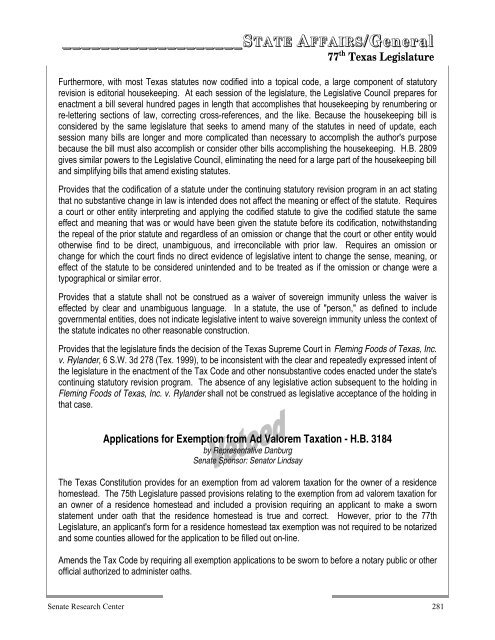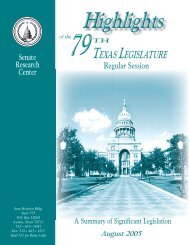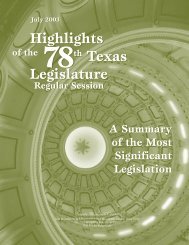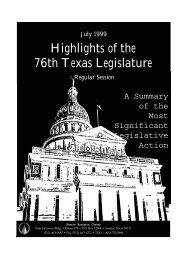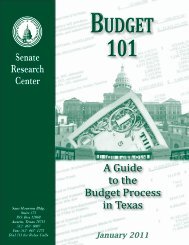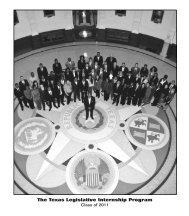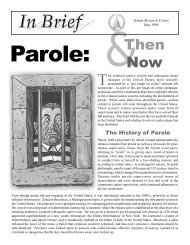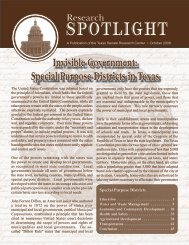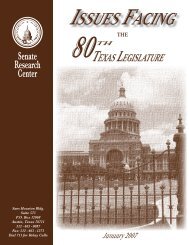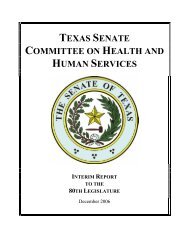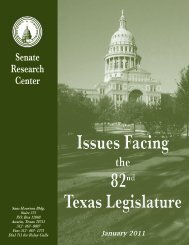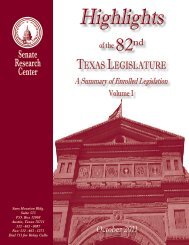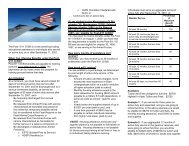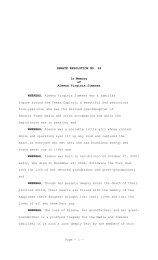Highlights 77th Texas Legislature - Senate
Highlights 77th Texas Legislature - Senate
Highlights 77th Texas Legislature - Senate
You also want an ePaper? Increase the reach of your titles
YUMPU automatically turns print PDFs into web optimized ePapers that Google loves.
___________________S TATE<br />
FFAIRS/GeneralGeneral<br />
TATE AFFAIRS<br />
77 th <strong>Texas</strong> <strong>Legislature</strong><br />
Furthermore, with most <strong>Texas</strong> statutes now codified into a topical code, a large component of statutory<br />
revision is editorial housekeeping. At each session of the legislature, the Legislative Council prepares for<br />
enactment a bill several hundred pages in length that accomplishes that housekeeping by renumbering or<br />
re-lettering sections of law, correcting cross-references, and the like. Because the housekeeping bill is<br />
considered by the same legislature that seeks to amend many of the statutes in need of update, each<br />
session many bills are longer and more complicated than necessary to accomplish the author's purpose<br />
because the bill must also accomplish or consider other bills accomplishing the housekeeping. H.B. 2809<br />
gives similar powers to the Legislative Council, eliminating the need for a large part of the housekeeping bill<br />
and simplifying bills that amend existing statutes.<br />
Provides that the codification of a statute under the continuing statutory revision program in an act stating<br />
that no substantive change in law is intended does not affect the meaning or effect of the statute. Requires<br />
a court or other entity interpreting and applying the codified statute to give the codified statute the same<br />
effect and meaning that was or would have been given the statute before its codification, notwithstanding<br />
the repeal of the prior statute and regardless of an omission or change that the court or other entity would<br />
otherwise find to be direct, unambiguous, and irreconcilable with prior law. Requires an omission or<br />
change for which the court finds no direct evidence of legislative intent to change the sense, meaning, or<br />
effect of the statute to be considered unintended and to be treated as if the omission or change were a<br />
typographical or similar error.<br />
Provides that a statute shall not be construed as a waiver of sovereign immunity unless the waiver is<br />
effected by clear and unambiguous language. In a statute, the use of "person," as defined to include<br />
governmental entities, does not indicate legislative intent to waive sovereign immunity unless the context of<br />
the statute indicates no other reasonable construction.<br />
Provides that the legislature finds the decision of the <strong>Texas</strong> Supreme Court in Fleming Foods of <strong>Texas</strong>, Inc.<br />
v. Rylander, 6 S.W. 3d 278 (Tex. 1999), to be inconsistent with the clear and repeatedly expressed intent of<br />
the legislature in the enactment of the Tax Code and other nonsubstantive codes enacted under the state's<br />
continuing statutory revision program. The absence of any legislative action subsequent to the holding in<br />
Fleming Foods of <strong>Texas</strong>, Inc. v. Rylander shall not be construed as legislative acceptance of the holding in<br />
that case.<br />
Applications for Exemption from Ad Valorem Taxation - H.B. 3184<br />
by Representative Danburg<br />
<strong>Senate</strong> Sponsor: Senator Lindsay<br />
The <strong>Texas</strong> Constitution provides for an exemption from ad valorem taxation for the owner of a residence<br />
homestead. The 75th <strong>Legislature</strong> passed provisions relating to the exemption from ad valorem taxation for<br />
an owner of a residence homestead and included a provision requiring an applicant to make a sworn<br />
statement under oath that the residence homestead is true and correct. However, prior to the <strong>77th</strong><br />
<strong>Legislature</strong>, an applicant's form for a residence homestead tax exemption was not required to be notarized<br />
and some counties allowed for the application to be filled out on-line.<br />
Amends the Tax Code by requiring all exemption applications to be sworn to before a notary public or other<br />
official authorized to administer oaths.<br />
<strong>Senate</strong> Research Center 281


